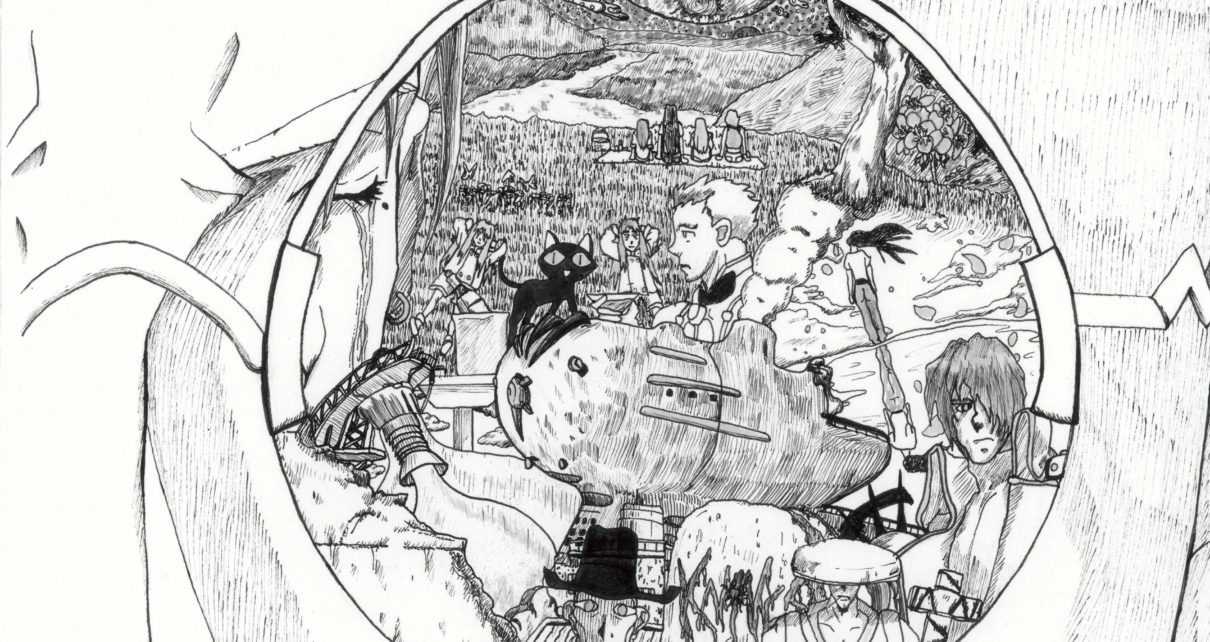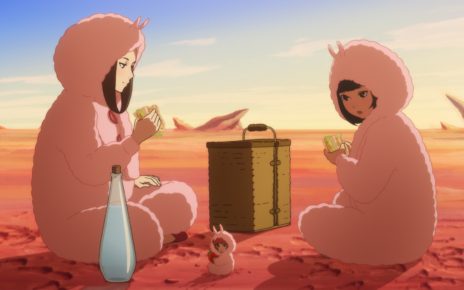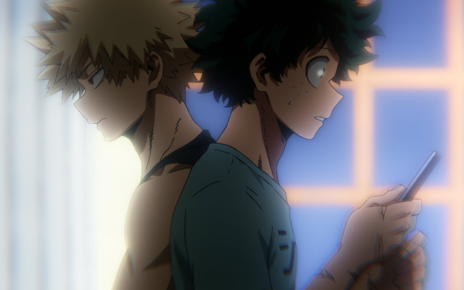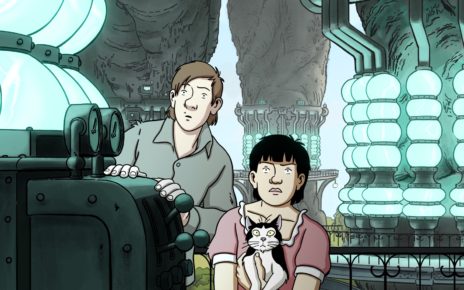This week The Dot and Line is looking back at Trigun. Check out our interview with Vash the Stampede’s voice actor Johnny Yong Bosch here, and check back in tomorrow for an interview with Dorothy Elias-Fahn, who played Meryl Stryfe.
While The Dot and Line was celebrating two decades of Shinichirō Watanabe’s incredible masterwork Cowboy Bebop last month, I recalled that another special show marked its own 20th birthday around the same time and instantly felt the occasion could not pass silently. That recollection led me deep into the kind of nostalgia trip I’m prone to:
It is the year 2003. Late at night, and you’ve spent much of it with Adult Swim. Anime, midnight snacks, and prayers for an easier day than the one you’ve just had. The season doesn’t matter, because you’ve just watched Inuyasha, and you’re preparing for the final block of shows before the encores. You know that the best is saved for last. Cowboy Bebop comes on and you partake of its glory. You’re transported to a world where you’re an outlaw, making money, running away from your past, with a crew of misfits along for the ride — in space, with a sweet jazz soundtrack. You’re on some adventure for a big bounty score, or just following a lead, or you might simply be trying to rescue your buddy from the grips of a digital singularity cult.
But then, after half an hour passes, a different show appears on the screen. You’re still in space, or at least you were, until you became stranded on a desert planet over a century ago when ships from Earth intended to spread life to the stars crashed due to a series of, to say the least, unfortunate events. You’re an outlaw, but you’re not a mercenary; this time you’re the one with a bounty on your head — $$60 billion worth (yes, “double dollars”). You’re running away from your past until it catches up with you, not because you’re damaged by an old pain but because you can’t remember the pain you’re accused of causing. As you wander the planet Gunsmoke (“No-man’s Land” in the manga), you meet misfits, friend and foe alike. And the soundtrack’s still sweet, but bitter, too; there’s jazz, some forlorn guitars, and hazy synths that complement the confusion that is your life. You’re on a journey with Vash the Stampede in another wonderful episode of Trigun.
It’s the way that Trigun told its story, and how unique it was, that made it so unforgettable.
Ever since it debuted in Japan in April 1998, Trigun, based on Yasuhiro Nightow’s manga, has held a special place in the hearts of many anime fans, in particular those in the West more familiar with the “Wild West” tropes and Christian allegories it dabbled in. It’s not that it was a particularly groundbreaking series; the animation wasn’t the best, and it stuck to many conventions. But it’s the way that Trigun told its story, and how unique it was, that made it so unforgettable for those like me who watched and returned to it for the past 15-plus years. The depths of emotion mined in those 26 episodes are impossible to shake, and it’s a whole lot of fun, too. Alongside Cowboy Bebop, which it was often paired with on Adult Swim, it was crucial in the exploding popularity of anime in the West, and Vash is still ranked as one of the most popular anime characters of all time.
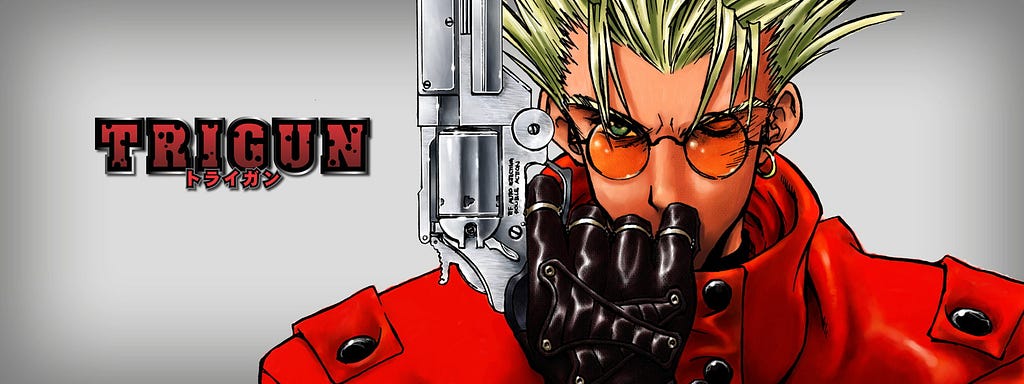
To summarize briefly, Vash the Stampede (sublimely voiced in the English dub by Johnny Yong Bosch in his widely acclaimed first anime role) is a red-cloaked eagle-eyed gunslinger, wanted for the destruction of the city of July — an event he has no memory of, beyond what immediately preceded it. Wherever he goes, Vash is feared, sometimes hated, for what he is. His true nature is a more interesting story, but without spoiling too much, he is more than meets the eye. Despite people’s hate, Vash preaches love and peace, attempting as much as possible to avoid bloodshed and death. In that way, Trigun makes an excellent companion piece to Rurouni Kenshin, which shares similar themes of nonviolence and challenges to pacifism (and voice actors, too, notably in the lead female roles, Trigun’s Meryl Stryfe and Rurouni Kenshin’s Kamiya Kaoru, both evocatively played by Dorothy Elias-Fahn). Vash is antagonized chiefly by his twin brother, Knives, and his lieutenants, who torture him relentlessly and represent his ideological opposite. At its core, Trigun is about living through pain, and keeping faith in a brighter tomorrow; its final two episodes, “Live Through” and “Under the Sky So Blue,” reflect this. The series is about loving thy neighbors, even when you disagree with them.

As much as it’s a serious show meant to be taken seriously, Trigun is hilariously goofy and amazingly well-designed. Zany characters come and go throughout; one villain is a huge razor-toothed dude who won’t commit a crime unless it’s flashy and bright, wielding a light-up gun and outfitting his and his crew’s armor in neon. Trailing Vash through the series are the aforementioned Meryl and her sidekick Millie Thompson who, in what has to be one of the most absurd-but-somehow-logical plot devices in anime, are literally insurance adjusters trying to prevent massive losses due to damage claims left in Vash’s wake (he’s the “Humanoid Typhoon”). Nicholas D. Wolfwood, a traveling priest with a wicked sense of humor, wields a huge cross-shaped gun and plays the conflicted, ruthless good-guy-with-a-gun to Vash’s selfless, sacrificial heroics, and together they’re a perfect pair. The wildly creative facial expressions on display throughout add to the giggles.
For all these reasons and more, Trigun is unforgettable. It’s a truly one-of-a-kind sci-fi western that manages to evoke laughter and tears with ease. Once you watch it, it won’t leave you. In my life, its themes have resonated deeply. Living to see tomorrow, believing in the future, confronting your demons and loving others — not to mention loving peace, for those of you concerned about the direction of our own world — Trigun has helped me through very tough times and if I’m being truly honest, dear reader, helped me grow into the very happy boy I am today.
So, as you’re watching this gem of a show, put one hand on your hip and the other hand out, peace sign up high, and say it loud with Vash and me: “This world is made of Love and Peace!”
Happy 20th, Trigun!
You can follow Wyatt Erchak on Instagram at @erchakwy.
Thanks for reading The Dot and Line, where we talk about animation of all kinds. Don’t forget to for this article and follow us on Twitter and Facebook.


